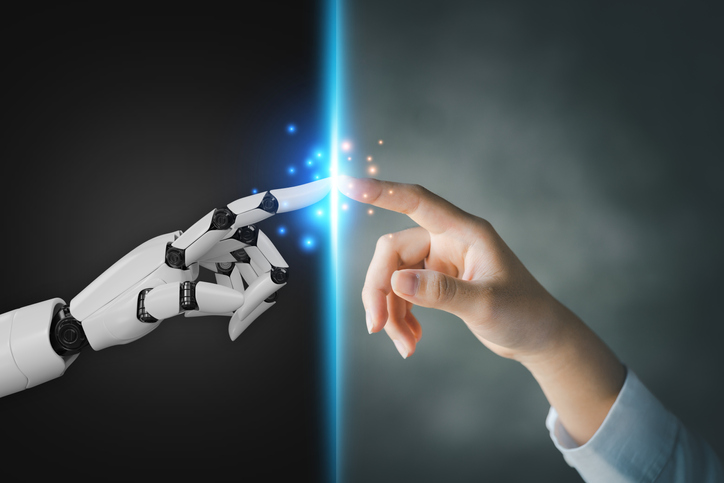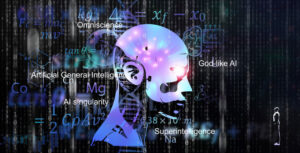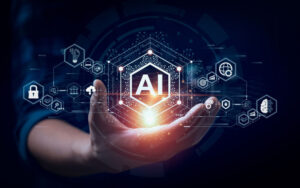AI Degree & Certificate Program Guides
Today’s AI students will build the machine intelligence of the future.
AI Degree Paths...
How Will You Work with AI in Your Career?
Learn AI: Identifying the AI Educational Path That’s Right for You
Learning AI means something very different to computer science majors fueling the AI revolution by advancing its capabilities than it does for business majors looking to harness those capabilities. Artificial intelligence jobs, and the degrees they require, are riding the AI revolution in one of three main directions. Learn all about AI degrees and certificate programs for students interested in…


Taking the newest AI developments and using them to optimize key functions in business and government takes a special combination of skills. Degrees that focus on the applications of artificial intelligence in business and government will help you hone the most practical and high-demand AI skills.

The most specialized fields may have the most to gain from AI, but also pose the biggest risks in using it. Professionals with an advanced understanding of AI and professional expertise in diverse fields, from healthcare to engineering, need degrees with a balanced, specialist education.



What is AI?
The AI revolution hit fast and hard. In only a few years, it’s come up from under-the-radar to become the most profound technological advancement of our time. Now, everyone is asking…
What is AI and Why Is it Important?
You can be part of the answer. Here’s what we know about the state of artificial intelligence today, and a glimpse of what it may become tomorrow.

While the big breakthroughs in AI are coming from experts with graduate degrees, no one starts off as a master. New degrees and certificates designed for students at every level are coming fast. Learn how to match your degree to your job goals, and how to cultivate your expertise with the right kind of educational programs.
Everyone starts somewhere in the long path to mastering machine learning and other complex AI concepts. A two-year associate program or an undergraduate certificate can prep you for entry-level AI competence or a higher degree right from the start.
A four-year AI bachelor’s degree is an educational foundation in the career field of the future. Combining important liberal arts studies with essential math, science, and programming concepts, AI bachelor’s degree programs are where you develop the core skills to sustain you for a lifetime of AI work and learning.
Most of the workforce in AI today got there on the strength of their master’s degrees. With advanced studies in the specialized concepts and tools used to build AI, master’s programs in artificial intelligence provide the elite skills needed to make an impact. Involvement in research and an opportunity to contribute original ideas gives you the edge to take control of your AI engineering career.
The demand for skilled AI professionals has come a lot faster than specialized degree programs can produce graduates. Focused AI certificate programs can take your training in math, stats, computer science, or similar fields and quickly convert it to the kind of advanced artificial intelligence expertise the markets need right now.
Any headline you’ve seen about AI in the past few years has a PhD graduate somewhere behind it. These degrees can take half a decade to earn but deliver the ultimate in knowledge and skill. Developing your own ideas for cutting-edge research and advanced applications in AI is all part of a PhD program in artificial intelligence.
Artificial Intelligence Techniques and Applications Emerging from AI Research, Development, and Training
The heavy stuff that makes those degrees and certificates so special is technology that is right next door to pure magic. Learn about some of the core methods and techniques you’ll use to create the next generation of intelligent programs.
Creating systems that learn from experience in the way that the human mind does is often the first step in developing a thinking machine. ML is the set of processes and techniques that create algorithms that assess data and evolve from the experience. It’s the core of most AI today and a subject you’ll have to master in any AI career field.
Providing tools that take ML to the next level, deep learning is a collection of techniques that create many layers of structure within an artificial neural network. Created from millions of data points, these algorithms can develop a sense of general features or characteristics in data and take generative and recognition systems to the next level.
For computers to think as we think, they must see what we see. Computer vision teaches systems to process visual inputs to detect and identify objects and activity. From self-driving vehicles to MRI machines that detect tumors almost before they start, these methods are at the heart of some of the most important applications of AI.
One thing that has always been a limitation in machine learning is machine perception. Humans come with built-in sensors and hard-wired processing power that gives us a constant barrage of information about the world around us to learn from.
A constant inspiration throughout the history of the study of artificial intelligence is the wonder of human intelligence. Through every step, every investigation, and behind almost every breakthrough is the goal of making machines a little bit more like human beings when it comes to just figuring stuff out.
Genetic algorithms are old tools that are finding new life in the world of machine learning.
Before neural networks were inspired by the functions of neurons in the human mind, another kind of learning algorithm was inspired by the grander process of evolution itself.
To speak and to understand is fundamental to our definition of intelligence. Advanced methods that train machines to decipher a wide range of accents, slang, and languages, and then to reply in kind, are a hot spot in AI development today. NLP that allows machines to communicate is core to advancing AI.
Automation and robotics tools take the hard challenge of putting together aspects of vision, learning, calculation, and motion to enact real physical change in the world around us. Going from code to the capacity of altering the world around it is one of the final steps in self-actualizing AI.
How AI is Creating Solutions in Business and Specialty Fields
While a lot of the action so far has happened in secluded labs at universities and big tech companies, the place where the AI wave is really finding traction is in the trenches of the business world. Jobs that take the latest breakthroughs and turn them into useful systems in different industries are where most AI engineers will end up working. Both specialist AI engineers and general business experts in AI will be needed here.
- Data Science
- Cybersecurity
- The Arts
- Radiology and Other Medical Diagnostics
- Nursing/Healthcare Informatics
- Psychology
- Medical Science
- Pharmaceutical Research & Development
- Law & Paralegalism
- Law Enforcement
- Earth Sciences, Meteorology, & Climatology
- Public Health and Epidemiology
- Transportation System Design
- Autonomous Vehicles
- Architecture
- Engineering
- Biotechnology
- Sustainability and Environmental Science
- Accounting
- Finance
- Social Media
- Gaming
- Software Development and User Experience
- IOT
- Customer Service
- Blockchain and Cryptocurrency
State-by-State Guide to the Universities Preparing AI Professionals and the Companies Hiring Them
Artificial intelligence is not a regional phenomenon. Nationwide, colleges and universities are developing programs to train the next generation of AI professionals. See the AI degree programs in your area, and the careers they can prepare you for.
What is Machine Learning?
Teaching machines how to teach themselves is the hottest subject in artificial intelligence today. It is also one of the most complicated. When you understand what machine learning is, it will open a new world in artificial intelligence and beyond. In applications ranging from data science to cybersecurity and much more, ML has taken on a life of its own.
See how exotic tools like deep learning have emerged from ML to become powerful engines for the most advanced AI systems today.
Dive into the differences between artificial intelligence and machine learning, and find out how becoming a master of ML algorithms can put you in the driver’s seat for destinations in AI and beyond.
Machine Learning Degrees and Certificate Programs at Every Level
With a longer pedigree than AI, machine learning degrees and certificates are easier to find. Find out what’s available and how to choose the right ML program at every level.
Machine Learning Undergraduate Degrees
Associate and bachelor’s degrees in machine learning stock your brain with the advanced math and statistical formulas you need to grasp modern ML algorithms. Undergrad programs can be a springboard to further studies in machine learning or prepare you for the most advanced degrees in artificial intelligence.
Master’s in Machine Learning
Master’s degrees in machine learning are where skills in algorithm development, training paradigms, and artificial neural network development are mastered. These are the degrees that front-line data scientists and AI engineers hold.
Machine Learning PhD
When new breakthroughs happen in machine learning, they are often made by people with a PhD behind them. Doctoral programs in machine learning are where the boundaries are being pushed in how fast and how accurately machines can be made smarter.
Machine Learning Certificate Programs
With a strong background in computer science or mathematics, you can make the jump to AI and ML with a machine learning graduate or postgraduate certificate program. Fast and inexpensive, post-bachelor’s and post-master’s certificates build on existing knowledge and abilities to give you the skillset the market demands.
Online Artificial Intelligence and Machine Learning Degrees & Certificate Courses
In a field where remote work is as common as keyboards, online studies are a natural fit.
Asynchronous classes let you build your own schedule around the rest of your busy days.
Video streaming and chat connections keep you in touch with professors and fellow students.
Staying close to home can keep costs down while opening up a wider range of schools than you find in your own neighborhood.
You’ll find the best online AI and ML degree and certificate programs here to unlock your career options from anywhere in the country.
Stay Up-to-Date as the AI Revolution Unfolds
AI is moving fast, and your education and career will depend on keeping up with it. See all the latest news and information about AI degrees, developments in the field, and amazing new applications.

The Big Decision: Should You Make a Career in General or Narrow Artificial Intelligence?
Read More »












